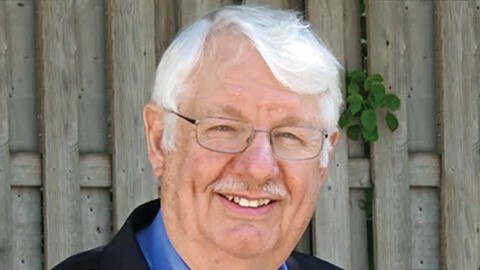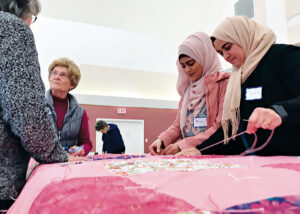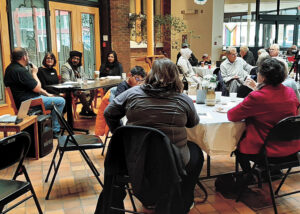It’s been a couple years now, but the experience stands out in my mind as if it were yesterday.
Engin Sezen, executive director of the Waterloo, Ont., Intercultural Dialogue Institute, invited my wife Marlene and me to share a meal with his and his brother’s families after dusk during Ramadan.
Even though Engin was a stranger to me, I was encouraged by a fellow Christian, Leon Kehl, to get to know Engin better and to accept his invitation to dine together at this important Muslim religious ritual, in the interests of better Christian-Muslim relations. Engin is very intelligent and accomplished, Leon told me, and that I would enjoy his company as our friendship develops.
Kehl, a member of Floradale (Ont.) Mennonite Church, had been working at getting Christians and Muslims together for several years. I admired what he was doing, and shared his conviction that we need to counter the prevailing tendency of violence between these two religions with the belief that “love is stronger than hate. It just takes longer.”
Even though we happily accepted Engin’s invitation, and anticipated the experience, we had our questions. This would be our first exposure to Muslim religious culture. Would we like the food? Would there be a language barrier? Would we say or do something unwittingly that would offend our friends? What would we find in common? Would there be enough commonality for us to carry on a conversation?
These questions, these anxieties, were all unfounded. After locating their small apartment in town, we were given a warm welcome. Engin’s wife and sister-in-law, even though slightly bashful, made us feel right at home. The kitchen was well lit and filled with the aroma of good food. The kitchen table was overflowing with steaming dishes; other food was boiling on the stove.
Since we had only a cursory experience with authentic Middle Eastern cuisine, the various dishes were explained to us, taking away any hesitation that this was going to be anything but a delightful dining experience. Before we sat down to indulge, we knew there would be prayers and perhaps other religious rituals as part of the Ramadan celebration. We entered into this shared experience, which have similarities to our own German-Swiss practice of offering thanks before our meals.
We were feeling more and more comfortable. Conversation flowed freely during the meal. There was no language barrier, and we soon felt at ease as we shared information about our families, our children and our elders. We found that we had a lot more in common in family life than we had differences.
As we retired to a comfortable sitting area to further get to know each other, we noticed another common practice. Yes, the women stayed in the kitchen to clean up and do the dishes, just the same as happens in our own families of origin. But it didn’t take long until they joined us. It developed into a family visit very similar to our own culture.
As we explained our own journey of church life and professional development, as well as our hopes and aspirations, it soon became clear that here, too, we both had very similar goals for our families and ourselves.
We asked for a more in-depth explanation of Ramadan, and expressed regret that following the 9/11 tragedy the tension between Muslims and Christians had intensified.
Even though it was getting late for us, we finished up the conversation with genuine warm feelings and valued the gaining of this new friendship. As we got up to go, we were given gifts of beautiful handmade pottery pieces by our hosts. This was more than we expected.
It was an inspired evening during which we gained new appreciation for persons of a different culture, where our world was expanded with enlightenment on the Muslim faith, all in the context of home and family, forming the beginnings of a new friendship that was graciously offered.
As Engin develops a new website for the upwards of 30,000 Muslims living in Waterloo Region, I hope that one of his goals is to pave the way for better Muslim-Christian relations through highlighting experiences like ours. We will learn that we have far more in common than we have differences.
Likewise, as he reaches the many disparate groups of Muslims from different countries and cultures, I hope he can teach them that they have much more in common than they think.
See also: “Mennonite develops friendships with Muslims to build grassroots peace.”







Leave a Reply
You must be logged in to post a comment.